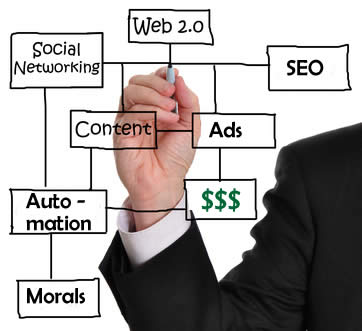The line of moral turpitude is what precludes one webmaster from embellishing on another persons property for financial gain. There is a fine line between SEO, Parasite SEO, Advertising and Web 2.0 Marketing; they are all means to an end, but ultimately at what cost?
Applying SEO is typically done on a domain by domain basis to accomplish a parallel objective (1) to gain domain authority and (2) rankings. The premise behind parasite SEO or web 2.0 marketing is, why use your website to get ranked if you can use another more authoritative domain to get ranked and then link to yours or potentially sell your offer?
The same could potentially be said about delivering traffic through advertising, but at least with advertising or buying media exposure, there is an ethical monetary exchange between publisher and promoter…
Granted, it is the same consumer that would reach your website regardless of the medium (Web 2.0, Ads or Search Engines) if it were in the top 3 results for a query organically, hence the attraction for parasite SEO is appealing for those who are intent on brand domination and seeking alternative routes to reach more consumers.
Although the risk of hedging your traffic sources is appealing, the question ultimately is (a) do consumers ultimately care where they click? And (b) how will this impact your brand or perceived value. Considering that people rarely remember the website they found (until the brand is established), hence, traffic sources from one perspective are irrelevant.
Let’s look at the differences as defined by the web at large as a consensus. For the sake of definition SEO is summarized as:
SEO:
Search engine optimization (SEO) is the process of improving the volume or quality of traffic to a web site or a web page (such as a blog) from search engines via “natural” or un-paid (“organic” or “algorithmic”) search results as opposed to other forms of search engine marketing (“SEM”) which may deal with paid inclusion. The theory is that the earlier (or higher) a site appears in the search results list, the more visitors it will receive from the search engine.
Parasite SEO:
Parasite SEO involves using established web properties to create profiles and / or web pages for the sole purpose of ranking those pages in search engines in lieu of your own website or have them serve doorway / promotional pages to your “primary” website.
Examples such as using Google Knol, Facebook, Digg, Squidoo, Hubpages or other established websites that CAN rank for corresponding user generated content administered by webmasters to then gain more traffic, leads or sales for the primary website.
Web 2.0:
Web 2.0 draws together the capabilities of client- and server-side software, content syndication and the use of network protocols. Standards-oriented web browsers may use plug-ins and software extensions to handle the content and the user interactions. Web 2.0 sites provide users with information storage, creation, and dissemination capabilities that were not possible in the environment now known as “Web 1.0”. In other words – user generated content that can rank on its own.
Advertising:
Advertising is a non-personal form of communication intended to persuade an audience (viewers, readers or listeners) to purchase or take some action upon products, ideals, or services. It includes the name of a product or service and how that product or service could benefit the consumer, to persuade a target market to purchase or to consume that particular brand. In other words – reaching the same target consumer that is aligned with your product or service with a skewed preference of influence.
Advertising has similar trappings to web 2.0 or parasite SEO whereby the surfer may have entered the website on another tangential trek (such as an email link, social media link, article, blog post, editorial link or search engine). Regardless of the method to deliver the visitor to that page, the advertisements sheer purpose is to compel the visitor to take action.
If they click the ad, one click and hop later they arrive on your landing page to see if the original intent they had is satiated by your value proposition or incentive and they either (1) determine to take the preferred action or (2) do not.
In either case they have successfully navigated a series of hops to reach your page through tactful placement or co-occurrence of some type of peer review or paid sponsorship (you either earned a link or paid for it) and that prospect either converts or it does not.
When is Far Enough Too Far?
Once again, this is a personal opinion and matter of ethics, but I feel the lines are drawn when you start to game the system from scraping others content and re-purposing it for personal gain. This blog and ping tactic was abused in the past, but made for adsense sites are still gaining traction and turning a profit from this “shady” monetization tactic.
For example, you spend 2 hours writing a stellar post for your blog and someone skims and streams your RSS feeds with viral intent (who in turn promote it as their own content). If their site gets indexed faster, that incremental traffic which was rightfully your own, gets funneled to their page and their ads (which they can set up in mass across various topics, keywords and industries).
When the lines of contextual advertising are blurred and / or automated through programs that scrape and re-purpose; this is a clear example of crossing the line. At the end of the day a few things are certain (1) the web has an immense amount of data exchange with millions of new pages daily entering the search engine result page arena and (2) competition exists.
Considering that traffic sources, content, relevance to noise ratios and the fact that those with more exposure reap the rewards of traffic, ethics and morality and profit or loss is a debatable contention which each webmaster must decide.
The darker shades of gray to black hat SEO pushing the envelope with push-button automation and throw-away domains on one hand exist as a backlash to rankings as a commodity (which inadvertently rose from a need for quality control) from search engineers to weed out signals of relevance to spam.
As search engines evolve and additional traffic sources are spawned, the urge for people to cut corners and turn a profit vs. those who play by the rules and reap a modest reward for all their hard work creates animosity, stress, anger and resentment.
Ultimately, the end result of getting traffic and coversion is the motivating factor as advertising, web 2.0 positioning, traditional SEO (on one site) or parasite SEO (using multiple authoritative sites) all deliver traffic; it’s just at what price to the psyche or conscience of those pulling the strings behind the scenes.
Morality and marketing rarely see eye to eye, so, before you consider automation or crossing a line or do unto others as you would have them do unto you, just remember, there is always another way to accomplish the same objective, you just have to do the work, put in the time and be patient enough to see the results of your labor.










Incredible post. “someone skims and streams your RSS feeds with viral intent (who in turn promote it as their own content). If their site gets indexed faster, that incremental traffic which was rightfully your own, gets funneled to their page and their ads” This I know first hand and have always wondered why noone has created some type of fingerprint that says “Hey Im the original no matter who was indexed first” One thing I have found, Google is very smart about this and even if someone gets indexed before you on 1 post, chances are google can see the other sites habits as your not the only site they are scrapping from. I also think google can read the time stamps also which would point your site as original, I doubt scrappers would change the time, because that would require actual work.
I guess online marketers and business owners should really be careful all the time especially when advertising is concerned. I remember my colleague who started this website for his home based business. Some of his ideas were copied by one of his competitors. How powerful is Google really? Want to learn more about this. Thanks.